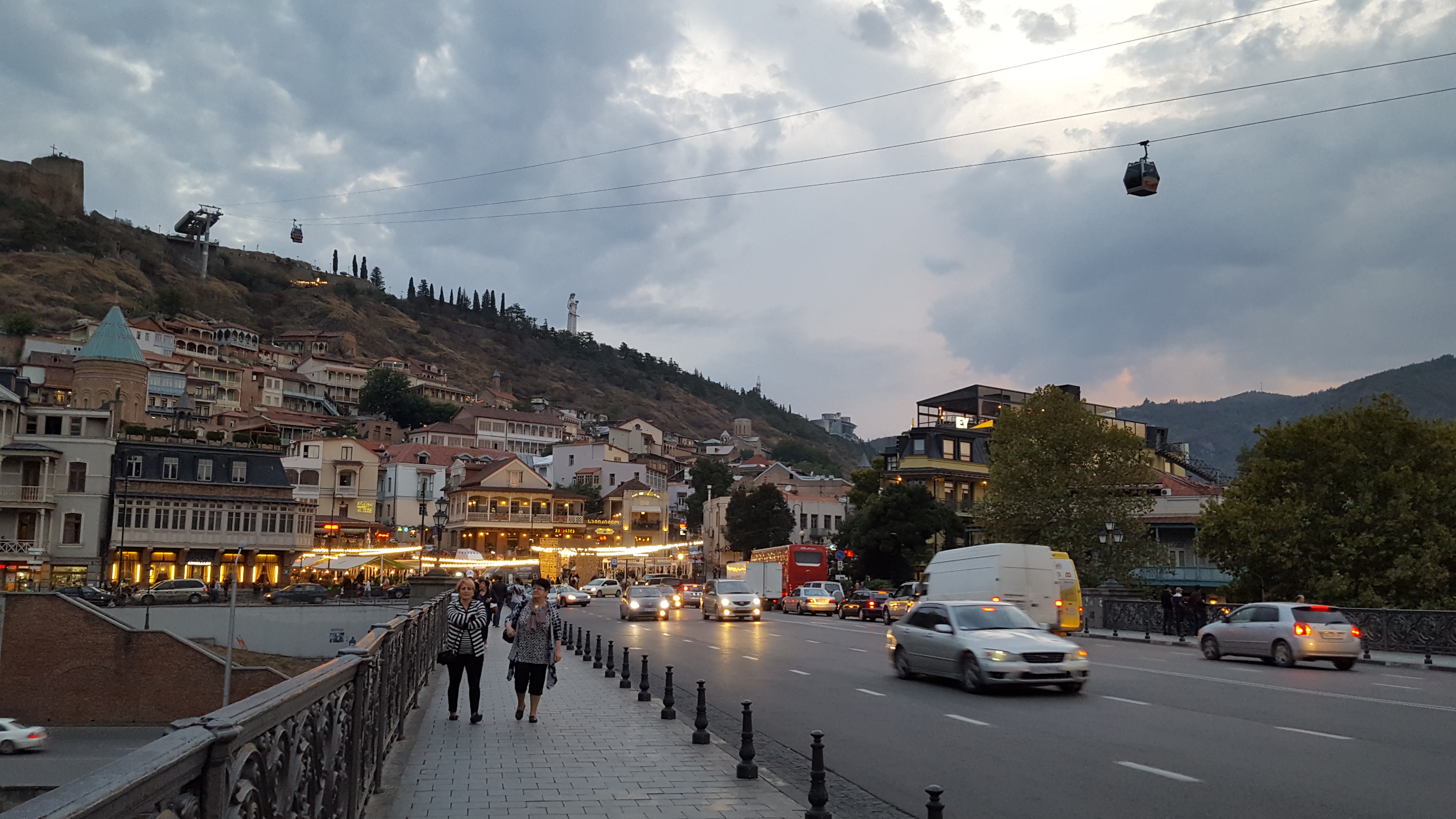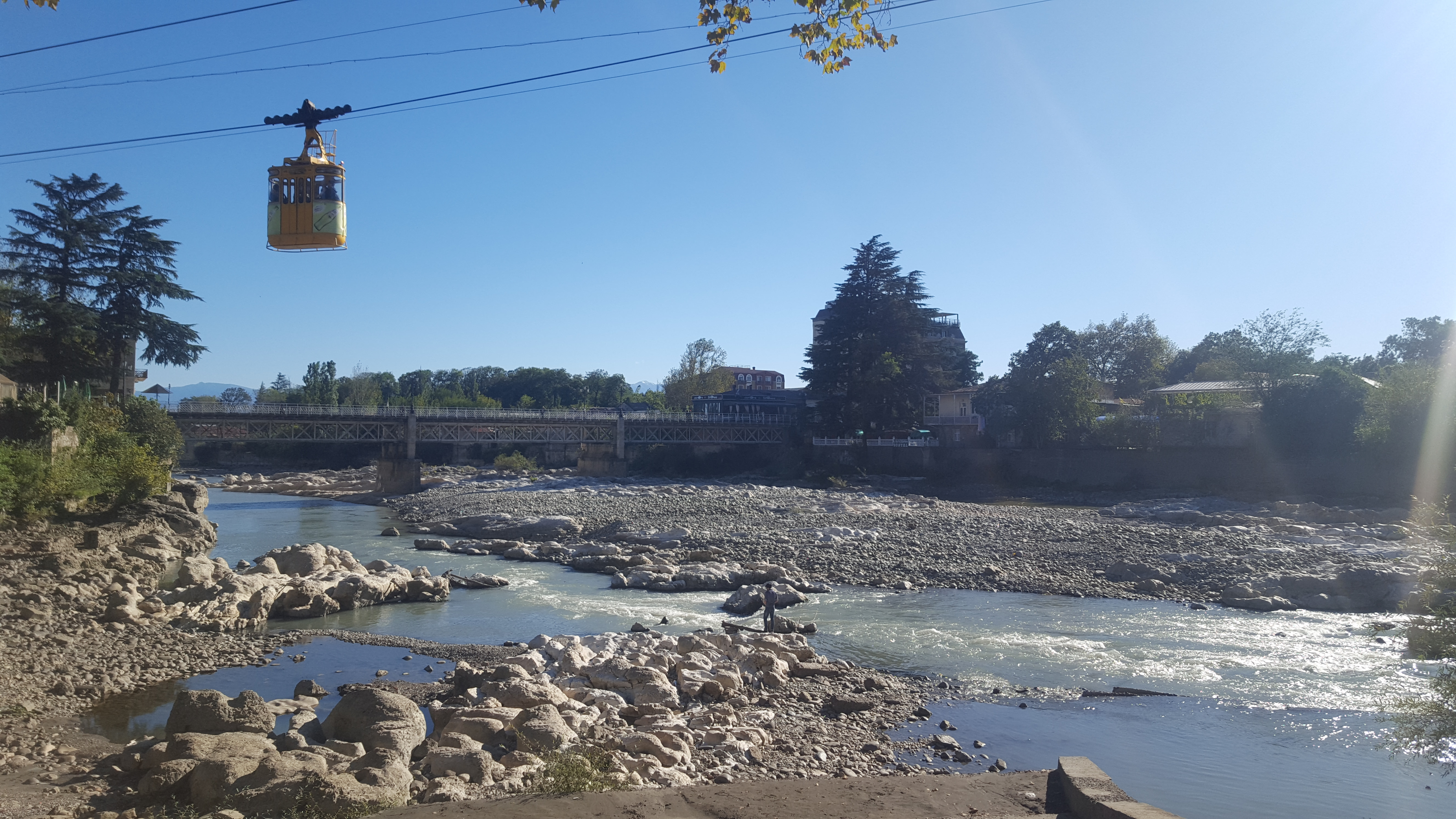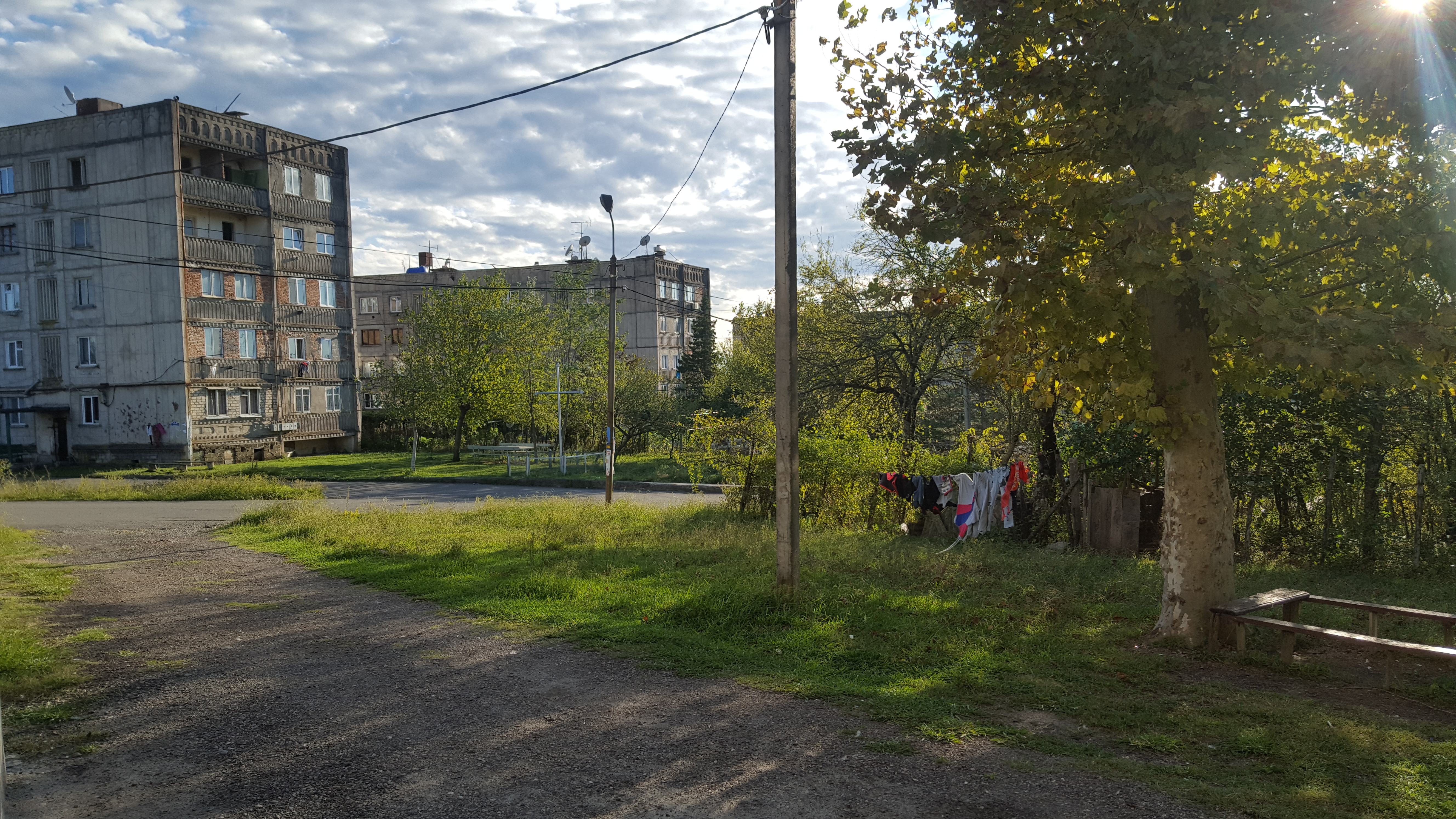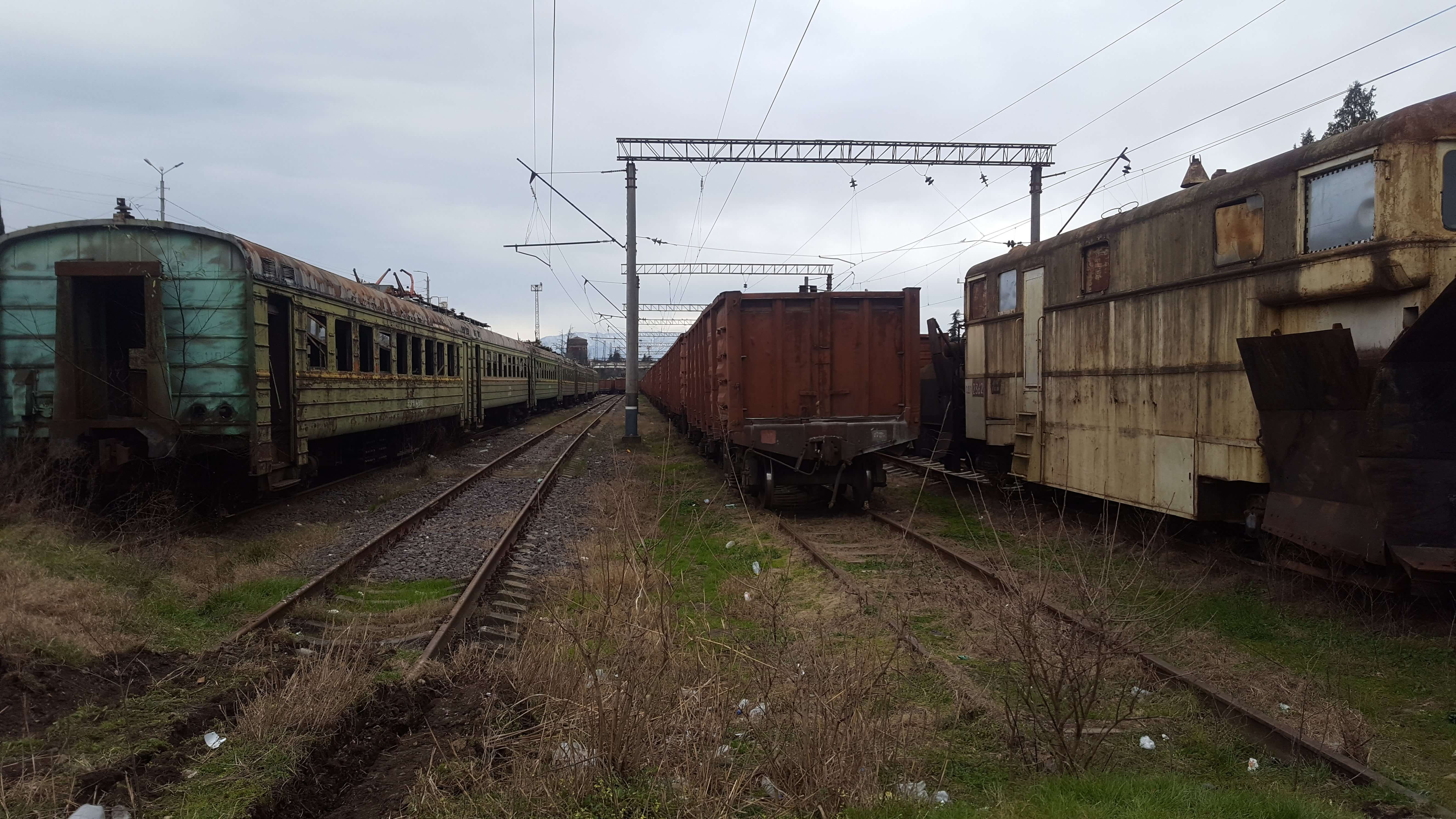I wouldn’t count myself as being overly dramatic to say that living in Georgia has been one of the toughest experiences of my life. After a year living in China I thought that Georgia would be a walk in the park. Nothing could possibly be crazier than life there, right? Wrong.
The culture shock of here has matched the shock of diving into a pool of ice water. The geographical proximity of Georgia to Scotland is irrelevant and I often feel as though I am living in an alternate reality. Perhaps maturity has brought with it better awareness, perhaps I am more set in my ways that I was when I travelled to China nearly five years ago or perhaps life here really is just 100% bizarre. Either way, adjusting to life in this former Soviet state has been a mentally exhausting, often frustrating experience and a process that I don’t think will be finished by the time I leave in June.
I have spent a lot of time reflecting on and trying to understand just why that is. What is it about this country that I just don’t seem to get? Why was living in China of all places easier than living here? Looking back on the post I wrote a few weeks after arriving, I can see now just how naive I was about the country and what my experience here would be like. Five months later and although I probably have more questions than I do answers, my knowledge of Georgian culture and society does now go beyond the superficial. This knowledge has helped to explain where my difficulties with this country lie and this post is an examination of those difficulties.
Before I begin, I would just like to make clear that I am not trying to criticise Georgia or Georgians. I also know that what I am saying does not apply to the whole country or all of its people. I simply want to share with you some of the reasons that I feel have made my integration here far from plain sailing. It’s also a chance to discuss what living here has made me realise about my own culture, culture in general and the general experience of living in a foreign country.
The Patriarchy and the Role of Women
Before coming to Georgia, I don’t think I had ever contemplated what it truly meant to live in a patriarchal society and I had certainly never been confronted with having to exist in one. It was made clear to me before coming here that this was a male dominated society but I never anticipated it to cause such frustration on my part. I also never expected to feel anger towards men for the simple fact that they were men.
I can’t speak for every man in the country, but in my experience, there is a trend for men to be, simply put, lazy. Particularly in the home. I have watched women at a supra (a traditional Georgian feast) come in and out with endless trays of food which they have spent hours slaving over as their husbands simply sit and drink and smoke and when they are so imbibed they can barely string a sentence together, stagger off to bed to leave the women to clean up all their mess.
Of course, the woman has had no time to join in on the festivities herself. And even if she did she would probably tire quickly of listening to the men make toast after toast, massaging their own egos as they down wine with the simple aim of out-drinking one another.
Although, fortunately, not the case in my host family, I have heard various stories of alcoholic fathers who sit round and do nothing all day. Many Georgian men engage in the act of birzha, which as far as I can tell involves sitting outside in small groups, sometimes playing backgammon, sometimes drinking, sometimes smoking but effectively achieving nothing until one can only presume they return home expectant of their dinner on the table. As pretty as some young Georgian men are, I certainly have no intention of signing myself up to an existence where I am expected to tolerate that sort of behaviour from my partner. Pair that with a garnishing of the odd sexist comment and there is no doubt that traditional gender roles still run deep in Georgian society.

I grew up in a world where my gender never factored into my hobbies, interests, social groups or career options. Action Man sat alongside Barbie in my childhood bedroom. Albeit often with tears, my dad spent a large part of my adolescence dragging me up mountains and cycling round lochs. Nobody batted an eyelid when I said that I wanted to pursue a career in the military. And more recently, nobody has ever told me “don’t go this place” or “don’t go to that place” simply because I am a female. Save the odd fuckboy, most men in my life have been inspiring and supportive individuals. Most importantly though, my gender has never, to my knowledge, dictated what anyone else expected me to do with my life.
And yet here, I can’t help but feel some of my actions influenced by the fact that I am a woman. I find myself dressing more conservatively. I am met by looks of utter confusion as the only girl picking up weights at the gym. And above all I feel myself diluting what I would probably call my alpha-female personality in the home and at work.
The other week I was chatting to the school secretary who speaks a little English. At one year younger than me, she is already married. And I imagine children are not far over the horizon for her. Other friends know many people who are far younger than that and already have their first, second or even third child. I am often asked if I am married yet or if I am looking for a husband. I try to politely explain that my parents would probably kill me if I told them I was engaged at this age. Here, not only is marriage at such an age acceptable, it is by and large expected. And whilst I have no facts to back this up, I can’t help but feel that perhaps for financial reasons it is in fact sometimes necessary.
I am under no disillusion that this is a uniquely Georgian practise. But from my own perspective of living here, it leaves a frustrating vacuum between me and my peers. How can I, as a twenty-four-year-old single girl with no intentions of settling down any time soon even remotely relate to the girl who at twenty-two has already been married for four years and is expecting her second child? In addition, I am left feeling somewhat ashamed. There is no pressure on me to pursue that life and I am free to do as I please. I am certain some of these women crave these liberties which are a given for me. Which brings me to my next point.
Social and Economic Opportunities in Georgia
Georgians will be the first to tell you that their life is “very hard.” Whilst far from a country of abject poverty, you don’t have to look far to see the fact that it is still very much a developing one. Cows wandering the streets even in cities, large parts of the motorways connecting the major cities being single lane, often badly paved roads and power-cuts not being out of the norm. Chatting with a teacher I work with, I found out that the government provides no support at all for her blind husband. Hell, I even just found out the other day that not only does our drinking water come from a fountain outside the house, but it also only operates at certain times of day. I should add that I live only a ten-minute walk from the city centre of Georgia’s third largest city and from a swanky two floor McDonald’s. Many people resort to pickled vegetables over winter because fresh is simply too expensive. People still make a huge amount of their produce at home. People make do and mend. (Click through to part one of a multi-part series on Georgian food to read more about how poverty impacts on the Georgian diet ).
Honestly, I was taken by surprise at just how developing this country still is when I first arrived (and frankly still am). If you confined yourself to Tbilisi during your time here, you would probably think that I am talking out my ass. But you don’t have to travel very far in this country to see where all the money is being kept. Living in a developing country has its obvious practical drawbacks but it’s nothing that I don’t feel able to adjust to. However the issues it causes run deeper than simply having to occasionally re-use a teabag.

Without going all “American Dream” on you, in realistic terms, I have come from a background where I have the means to do more or less anything that I want. The list of things I can’t do with my life is far shorter than the list of things that I can do. Yet here, I am surrounded by people who feel as though they have little opportunity to change or improve their lives. Whether it be due to lack of money, lack of foreign language ability or simply that it be the fault of the government, many here sense that they are stuck in the life that they have.
A question that I usually revel in answering is “How many countries have you been to?” And yet here I often mumble my answer and hope that we can move on with the conversation as quickly as possible. Most people, even the English teachers that I work with have never had an opportunity to go abroad. Usually for those that have, it’s to neighbouring Turkey or to visit parents who are working abroad (another very common fact of life here). I feel forever the spoiled brat for the fact that I was able to simply drop my life in Scotland to come here as a “volunteer” and earn what can in many instances be a better wage than locals. Again, it’s an experience which sometimes leaves me feeling a little ashamed and as if there is a small uncross-able void between myself and the majority of the Georgian population.
Of course a lot of this is caused by the residual effects of the Soviet Union and the breaks that this put on many country’s development. And its impact can still be felt in other aspects of daily Georgian life, including the way people interact and relate to one another.
Collectivist Culture
Whether the collectivist nature of Georgian society is a relic of Communist times or is something older, I am simply not enough of an expert on to make comment. But the fact that this tendency persists is more than evident. Many generations of families live together, and it is still common for a son to stay at home and for a wife to move in with his family.
I don’t know if a group of teenagers still struggling with their own sense of self is the best pool of people to take this from but from what I have seen most people have similar interests – Coldplay, Barcelona FC, dancing and Angelina Jolie. I see children extensively helping one and another out in class. Sometimes this spills over into what is plain and simple cheating, but for them they don’t see it that way. It’s just helping a classmate out. Everyone seems to know each other’s business and asking personal questions – e.g. what your salary is – is commonplace. People rely more on one another for help and information rather than on systems or organisations.
This ‘we-ness’ of Georgia maybe doesn’t cause quite so many difficulties in my daily life. It does lead to some frustrations as at times I see it translating into an unwillingness for people to take responsibility for their own actions. Something is always someone else’s fault or someone else’s problem to fix.

The programme that I am working for is a prime example. Its premise? Take a bunch of foreigners (most of whom are not even trained teachers) and bring them to the country to teach our teachers how to be teachers. There seems to be an underlying notion that these foreigners can come and with only a few hours contact a week magically transform the Georgian education system.
Mostly it is just something that contrasts greatly with the world I grew up in. Whatever way you look at it, the UK is an individualistic society. There is a heavy focus on ‘I’ and the qualities of independence and self-reliance are highly valued and instilled into nearly all of us. To varying degrees uniqueness, whether it be in the way one dresses, their interests or their personal opinions is valued. Observing the contrast between here and home has given me a newfound understanding and appreciation for the society that I grew up in. It also explains a lot about the people around me at home and about myself.
Responsibility for oneself often translates into organisation, the Georgian attitude to which is quite different from the West.
Planning and Communication
Something that Georgians probably should have held onto from Soviet times was the “plan” part of “plan-economy.” Georgian lack of organisation and communication might be the single most infuriating factor that I have to deal with daily. I couldn’t tell you the amount of times that a colleague and I have agreed to do a specific topic or activity in the next lesson and by the time we get around to it they have already forgotten or changed their minds (without informing me I should add). And don’t even think about trying to consider more than one lesson into the future. That just ain’t gonna happen. Things are forever changing at the last minute. Just today two of my lessons were cancelled because “The class didn’t feel like it.”
Also, nothing seems to be written down in this country. A complex network of marshuktas (routed taxis) form the backbone of Georgian public transport. These minibuses will stop wherever you request along their designated route. My ultimate goal during my time here is to find the Ministry of Marshuktas because I have no idea who is managing this nationwide transport system. I am yet to see a timetable or any indication that random men aren’t just driving round in a minibus with a random number stuck in their window and that we aren’t all just hoping for the best. Actually, I think that is what is happening. By some sort of Georgian magic, the system works though and there are a regular stream of buses around city and country. In the UK this system would have collapsed a long, long time ago.
Admittedly at times Georgian disorganisation works to my advantage. I would be lying if I said that I hadn’t played dumb at times. “Ohhh, you wanted that done for todaayyyy?? Sorry I didn’t realise.” Or, “Sorry, I can’t do this lesson today something really urgent and important has just come up.” (It’s normally Blue Lagoon cocktails and karaoke) but it’s an irritating one and I’m very excited to return to bureaucracy and form filling.
All the above has been compounded by the unique set of circumstances under which I am here. I live with a Georgian family and work in a Georgian school. In my daily life I have close to zero interaction with other expats. Whilst Chinese culture might seem equally as bizarre and far removed as here my situation there was completely different. I studied at a university with dozens of other, many English speaking, foreigners and Xi’an generally had a big expat community.
To a certain extent I could continue to live the life I had at home, albeit sometimes in a different language and with more days coughing up black shit from pollution. But at least that was a language I could string together more than four words sentences in. A lack of Georgian (or even Russian) has made my integration even tougher. Had I come here as a tourist I am certain I would have fallen head over heels for the place and that my relationship with Georgia would have forever remained in the honeymoon phase. Living in a country, especially at the close proximity that I do, I am learning, is far from visiting a place as a tourist.
This experience has forced me to reflect on and evaluate a lot what it is that I value. It has made me realise just how much of an impact the society that we grow up on has on our identities (something that I am becoming more and more convinced is something that is impossible to change about ourselves). I see that we do not all live in the same reality – our goals and what matters to us, either as individuals or as the collective, are often very, very different. And it has given me a true appreciation for the world which I come from – that overly rule-abiding island of selfish Brits.
And to think, all I wanted was some dumplings, homemade wine and a few Stalin statues.
For something slightly more lighthearted about my time in Georgia be sure to check out some of my other posts about life in Georgia including my experience at a Georgian birthday party and enjoying supporting the Georgian national football and rugby teams at several sports games.

Comments
8 responses to “The Realities of Living in Georgia”
Well done, Tara. I, too, would like to find the Ministry of Marshutkas. I suspect it is actually a private cabal that conspires to create artificial shortages for maximum crowding and driver profit.
Thanks Andrew. It would certainly explain A LOT :L
[…] See how I feel about Georgia five months later here. […]
A fascinating insight into your Georgian adventures! You write brilliantly and thoughtfully. I’m sure you’ll learn alot from your experiences. I look forward to reading the next chapter!
Thank you so much Suzy and for taking the time to read it 🙂 Whatever I write next probably won’t be quite so insightful (one can only have so many epiphanies) but entertaining I hope nonetheless!
well done you are brilliantly awesome lookingforward for moreand thank you for your wonderful experiences
Thank you so much kartheek, I hope I can continue to keep you entertained 🙂
[…] system on its last defences to protect me from a dreaded winter cold, emotionally drained from the four months I had just spent living in Georgia and with a healthy dose of financial stress on my […]